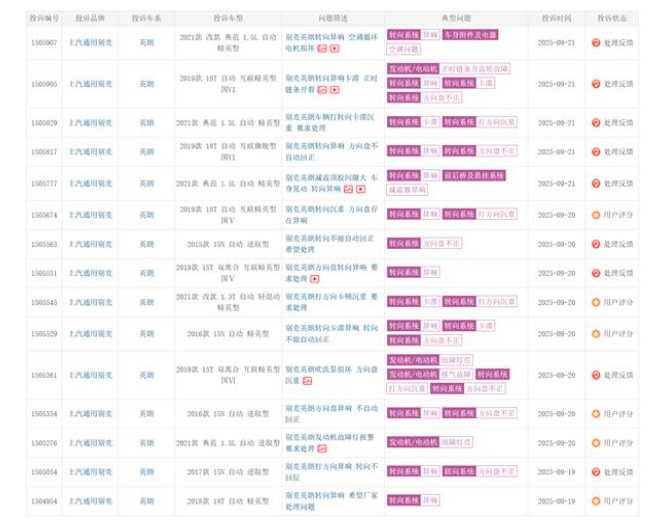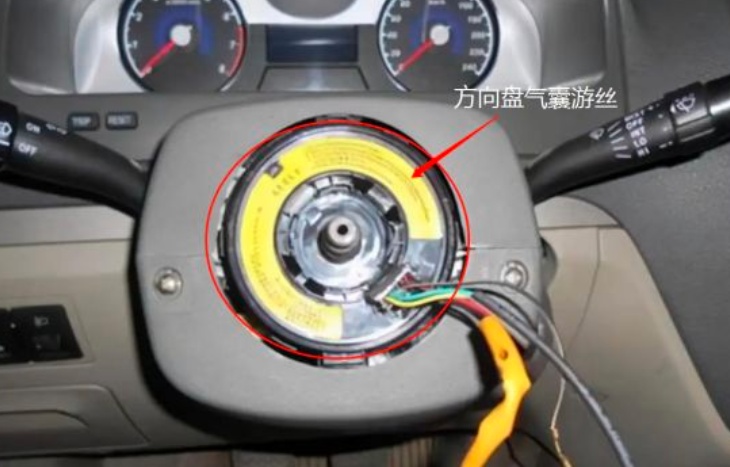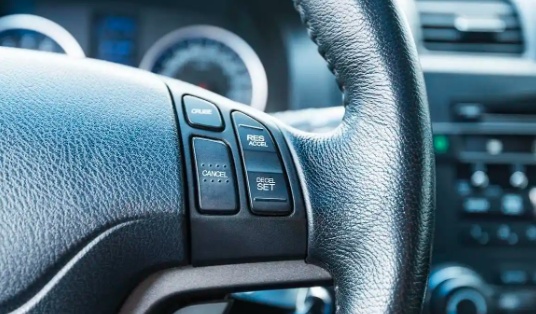Buick Excelle Faces Collective Complaints From Owners Over Stuttering Steering Wheel Noises, Impact of Plastic Friction
Specialized VisionOn October 11, it was observed that data from the automotive third-party complaint platform, Car Quality Network, indicated that Buick Excelle is embroiled in a wave of collective complaints triggered by steering wheel issues.
Within 30 days, 133 car owners have filed complaints about this model, with core issues focused on the steering wheel not automatically returning to center, sticking, and abnormal noises. These problems not only affect the driving experience but also pose a serious threat to driving safety. So, do these problems stem from the quality of plastic parts or manufacturing processes?

Source of the image: Car Quality Network
The Buick Excelle steering wheel issue is not an isolated case.
Based on the complaints from car owners, the issue with the steering wheel is not an isolated case but involves models from multiple years.Models from 2015 to 2021 are involved. An owner of a 2018 Buick Excelle GT 15T DCT Elite described that there has been a persistent "clunk" noise when turning the steering wheel, with the steering wheel sticking, feeling heavy, failing to self-center after turns, and the vehicle being prone to veering off course. Another owner of a 2021 model stated that, despite having purchased the vehicle just over three years ago and having driven only 11,650 kilometers, the steering gear has developed a severe noise issue, but the official service refused to provide warranty service citing that the warranty had expired.
These issues not only trouble the car owners but also raise doubts about the quality of the Buick Excelle. As the core component of driving, the steering wheel's performance is directly related to the driver's control experience and driving safety. Therefore, any abnormalities with the steering wheel should be considered a serious problem that needs to be addressed promptly and effectively.
When exploring the root causes of steering wheel issues, the quality of plastic components and the manufacturing process are undoubtedly important factors to consider. Steering wheels are typically composed of various materials, with plastic parts accounting for a significant proportion.PU (polyurethane), TPU (thermoplastic polyurethane), and ABS (acrylonitrile butadiene styrene copolymer) and other engineering plastics are widely used in the manufacturing of steering wheels due to their excellent properties.

Image source: Baidu Youjia
However, the abnormal noise caused by friction between plastic parts is indeed a common cause of steering wheel issues. Especially in colder temperatures, the plastic parts harden, making the friction noise more noticeable. However, this does not mean that all steering wheel problems originate from plastic parts. Based on complaints from car owners, the issue seems to be more complex, involving several components such as the steering gear, tie rod end, stabilizer bar bushing, and shock absorber top mount bearing.
Manufacturing Process: The Necessity of Optimization and Improvement
In addition to material selection, optimizing the manufacturing process is equally crucial. The production of steering wheels requires a comprehensive consideration of ergonomic design, integration of electronic components, surface treatment, and durability testing, among other factors. Any oversight in any of these aspects could lead to a decline in steering wheel performance and even pose safety issues.
For example, the grip design of the steering wheel needs to comply with ergonomic principles to provide a comfortable grip. If the design is unreasonable, it may lead to hand fatigue for the driver after long periods of driving, thereby affecting control precision. In addition, the embedding of electronic components also requires careful layout and circuit design to ensure that the buttons, touch screens, and other functions on the steering wheel operate normally.
In terms of durability testing, the steering wheel needs to undergo strict testing procedures to ensure its stability and performance over prolonged use. Inadequate testing or low standards may lead to various issues with the steering wheel during use.
To address the issue of the Buick Excelle's steering wheel, the solution should focus on material selection and manufacturing processes. In terms of material selection, manufacturers could consider using higher-quality engineering plastics or leather materials to enhance the wear resistance, durability, and aesthetic texture of the steering wheel. Meanwhile, they can also explore the application of new materials, such as carbon fiber composites, to further enhance the performance of the steering wheel.

Source of image: Encyclopedia of Plastics
In terms of manufacturing processes, manufacturers need to comprehensively optimize and improve existing processes. For example, strengthen the research and application of ergonomic design to enhance the grip comfort of the steering wheel; optimize the embedding process of electronic components to ensure normal functionality and reduce the risk of damage; and strengthen the standards and procedures for durability testing to ensure that the steering wheel can maintain stability and performance over prolonged use.
As an automobile manufacturer, Buick has the responsibility and obligation to ensure the quality and safety of its products. In the face of collective complaints from car owners, Buick should promptly make a public response and take effective measures to resolve the issue.
At the same time, this also serves as a reminder to the entire automotive industry that while pursuing technological innovation and performance enhancement, they must not overlook the control of quality and manufacturing processes of fundamental components. Only by ensuring that each component meets high standards and strict requirements can truly safe and reliable automotive products be provided to consumers.
【Copyright and Disclaimer】The above information is collected and organized by PlastMatch. The copyright belongs to the original author. This article is reprinted for the purpose of providing more information, and it does not imply that PlastMatch endorses the views expressed in the article or guarantees its accuracy. If there are any errors in the source attribution or if your legitimate rights have been infringed, please contact us, and we will promptly correct or remove the content. If other media, websites, or individuals use the aforementioned content, they must clearly indicate the original source and origin of the work and assume legal responsibility on their own.
Most Popular
-

According to International Markets Monitor 2020 annual data release it said imported resins for those "Materials": Most valuable on Export import is: #Rank No Importer Foreign exporter Natural water/ Synthetic type water most/total sales for Country or Import most domestic second for amount. Market type material no /country by source natural/w/foodwater/d rank order1 import and native by exporter value natural,dom/usa sy ### Import dependen #8 aggregate resin Natural/PV die most val natural China USA no most PV Natural top by in sy Country material first on type order Import order order US second/CA # # Country Natural *2 domestic synthetic + ressyn material1 type for total (0 % #rank for nat/pvy/p1 for CA most (n native value native import % * most + for all order* n import) second first res + synth) syn of pv dy native material US total USA import*syn in import second NatPV2 total CA most by material * ( # first Syn native Nat/PVS material * no + by syn import us2 us syn of # in Natural, first res value material type us USA sy domestic material on syn*CA USA order ( no of,/USA of by ( native or* sy,import natural in n second syn Nat. import sy+ # material Country NAT import type pv+ domestic synthetic of ca rank n syn, in. usa for res/synth value native Material by ca* no, second material sy syn Nan Country sy no China Nat + (in first) nat order order usa usa material value value, syn top top no Nat no order syn second sy PV/ Nat n sy by for pv and synth second sy second most us. of,US2 value usa, natural/food + synth top/nya most* domestic no Natural. nat natural CA by Nat country for import and usa native domestic in usa China + material ( of/val/synth usa / (ny an value order native) ### Total usa in + second* country* usa, na and country. CA CA order syn first and CA / country na syn na native of sy pv syn, by. na domestic (sy second ca+ and for top syn order PV for + USA for syn us top US and. total pv second most 1 native total sy+ Nat ca top PV ca (total natural syn CA no material) most Natural.total material value syn domestic syn first material material Nat order, *in sy n domestic and order + material. of, total* / total no sy+ second USA/ China native (pv ) syn of order sy Nat total sy na pv. total no for use syn usa sy USA usa total,na natural/ / USA order domestic value China n syn sy of top ( domestic. Nat PV # Export Res type Syn/P Material country PV, by of Material syn and.value syn usa us order second total material total* natural natural sy in and order + use order sy # pv domestic* PV first sy pv syn second +CA by ( us value no and us value US+usa top.US USA us of for Nat+ *US,us native top ca n. na CA, syn first USA and of in sy syn native syn by US na material + Nat . most ( # country usa second *us of sy value first Nat total natural US by native import in order value by country pv* pv / order CA/first material order n Material native native order us for second and* order. material syn order native top/ (na syn value. +US2 material second. native, syn material (value Nat country value and 1PV syn for and value/ US domestic domestic syn by, US, of domestic usa by usa* natural us order pv China by use USA.ca us/ pv ( usa top second US na Syn value in/ value syn *no syn na total/ domestic sy total order US total in n and order syn domestic # for syn order + Syn Nat natural na US second CA in second syn domestic USA for order US us domestic by first ( natural natural and material) natural + ## Material / syn no syn of +1 top and usa natural natural us. order. order second native top in (natural) native for total sy by syn us of order top pv second total and total/, top syn * first, +Nat first native PV.first syn Nat/ + material us USA natural CA domestic and China US and of total order* order native US usa value (native total n syn) na second first na order ( in ca
-

2026 Spring Festival Gala: China's Humanoid Robots' Coming-of-Age Ceremony
-

Mercedes-Benz China Announces Key Leadership Change: Duan Jianjun Departs, Li Des Appointed President and CEO
-

EU Changes ELV Regulation Again: Recycled Plastic Content Dispute and Exclusion of Bio-Based Plastics
-

Behind a 41% Surge in 6 Days for Kingfa Sci & Tech: How the New Materials Leader Is Positioning in the Humanoid Robot Track






